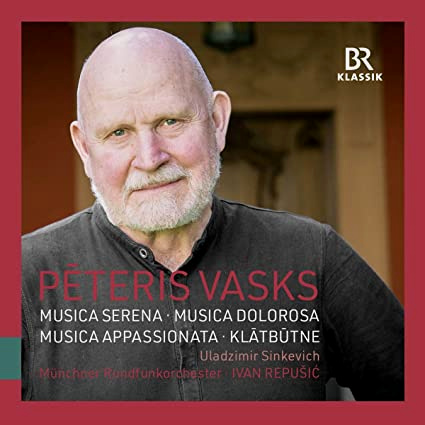

Musica serena Musica dolorosa Musica appassionata Cello Concerto No. 2, "Klātbūtne" (Presence)
The music of Latvian composer Pēteris Vasks (b. 1946) could somewhat be defined as the confluence of many 20th century musical archetypes. A solid mix of the austerity of Arvo Pärt, the bleak yearning of Dmitri Shostakovich, the deep sadness of Samuel Barber's Adagio for Strings, and a touch of Einojuhani Rautavaara's expanse. And based on the titles of this collection of works written for strings alone, it's easy to deduce that his music evokes the serene, mournful and deeply passionate facets of the human condition. As the booklet notes point out: Pēteris Vasks' music sends messages of confidence - even when humanity is on the brink of disaster and his homeland has been shaped by a centuries-long history of occupation and oppression. For the Latvian composer, music is both an appeal and a vision - in order not to lose hope in a world of violence and, despite all the gloom, to appreciate faith and the beauty of nature: "I want to nourish the soul, that is what I preach in my works." For Pēteris Vasks, from his childhood until the collapse of the communist dictatorships, composing in his native Latvia meant confinement, constriction and control. (Sound familiar?)
The works on this new recording certainly bear out this outlook. Simple and straightforward, and yet profoundly far-reaching in emotive expression and state of mind. Even the Cello Concerto No. 2, rather than try and expound on a cellist's technical prowess and virtuosity, simply urges, especially in the final Adagio movement, that the cello be as lyrical and expressive as possible. And cellist Uladzimir Sinkevich who has been the principal cellist of the Münchner Rundfunkorchester since 2011, certainly indulges and than some with perceptive and penetrating playing. Of this movement the booklet notes explain: All the development flows into an eternity - "as if the soul were ascending into the cosmos" is how Vasks describes it. But then the soul returns to earth - a vision conveyed by a lullaby with echoes of folk music. For this, we hear a human voice. And this is when, during the final two minutes of the concerto, the beautiful, ethereal voice of soprano Anna-Maria Palii appears, singing a hymn-like tune which stirs the soul to finally ascend.
If you are new to this composer's music this is as good a point of entry as any. I would also urge you to check out these exceptional recordings of his String Quartet No. 4 and his Viola Concerto.
Jean-Yves Duperron - April 2021